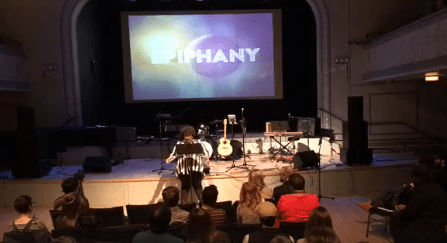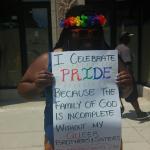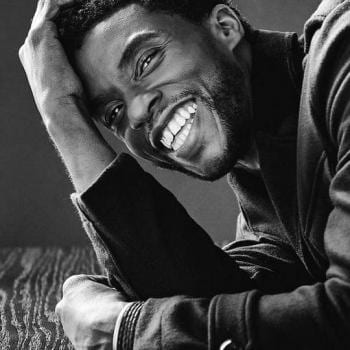On Sunday, February 24th 2019 I preached at Forefront Church in Brooklyn. Pastor Jonathan and I have spent a lot of time talking about spiritual violence, trauma, and what processing these things can look like. We decided that the week before Lent started was a good time to invite others into thinking about this and delve into these things in a congregational setting. The transcript is below and here is the link to the podcast:
TRANSCRIPT:
I don’t know how often preachers give content warnings ahead of sharing a word with folks but I feel it’s important that you’re aware of what we’re about to get into. We’ll spend today’s sermon considering Jesus, stillness, spiritual violence, and religious trauma. And note – I did say “we” so prepare yourself to be engaged in conversation with yourselves on what we’ll get into today. Introverts and others taxed by small group conversations, you can take a sigh of relief because our time constraints will totally disallow me from me encouraging you to talk these things over with others
I should also note that since we’re about a week and a half out from Lent, Pastor Jonathan asked me to tie that into what I share this morning.
So if you’re tracking we’re talking Lent, Jesus, stillness, spiritual violence, and religious trauma. In 20-ish minutes or so. No pressure at all.
Even though I’m just meeting y’all and you’re just meeting me, I trust that we got this.
So let’s start out by speaking about Jesus. More specifically let’s center our attention on the story of what happened *right before* his temptation in the wilderness a) because it’s liturgically appropriate to consider during this time of the year and b) because the 40 day period of Lent’s observance is one in which we are pushed to consider the time Jesus spent fasting in the wilderness right before launching his public ministry.
There are 3 Gospel accounts that speak of this time but we’re going to start with Mark because he gives us the quick and dirty.
Mark 1:12-13 says, “And the Spirit immediately drove him out into the wilderness. He was in the wilderness forty days, tempted by Satan; and he was with the wild beasts; and the angels waited on him.”
Many of us are familiar with what happens after he leaves the wilderness because the stories of Jesus’ public ministry, death, and resurrection are cornerstones in the Christian faith. But what was going on before?
Well, the accounts of Matthew and Luke give us some details. They briefly speak about things like Jesus’ birth, his family fleeing an oppressive state and migrating to ensure his and their survival, and his religious formation. We get a snapshot into his life but aren’t privy to a whole lot of what happened in his first 30 years.
What I find interesting is there’s radio silence from ages 12 to 30 and then out of nowhere the texts shows Jesus popping up on the banks of Jordan River to get baptized by his cousin John.
We’ll get to the significance of this encounter in a moment but can we pause for a second and talk about this gap in time.
I know there’s a WHOLE lot of life that happened for me between 12 and 30. This is critical time in human development, y’all. I went to high school, then left New York for college and grad school. I started processing through what made my soul sing, what I wanted to do with my life and my days. I came out to myself a couple of times and eventually I started coming out to other people. I journeyed through an entire spectrum of politicism (like from card carrying member of the college republicans to a super queer, radical who literally has a tattoo that is an FU to the concept of empire). I found God, lost religion, and committed to a process of theological wrestling, deconstruction and reclamation that is freeing up my spiritual and emotional energy to prioritize loving people like Jesus bids me to love.
There’s so much I can say as a 32 year old Black American pansexual pastors kid from Queens with a super blended, sorta complex, multicultural, sociopolitically diverse family. There are *stories* I can tell you as someone who’s always questioned everything, from asking why certain things or people were vilified when I was a child to how were systems impacting people’s very real lives in my work as a minister but also as a student and as a former employee of a mega church, foster care caseworker, youth worker, and educational advocate.
I digress. Knowing all this leaves me wondering what Jesus’ life looked like during this period. All we know is what Luke 2:52 says. “Jesus increased in wisdom and in years, and in divine and human favor.”
So we know that this growth and increase somehow takes Jesus from being a 12 year old who was so hungry for spiritual edification that he ran away to spend time sitting with and asking questions of spiritual teachers to being a 30-something standing on a riverbank who is sure enough of his convictions to have traveled to make a public declaration of faith AND moral alignment via baptism by a radical prophet calling for spiritual and material equity.
What do you believe and where do you stand? What convictions give your faith and sense of belief their shape?
If we were to around the room and share our thoughts, I’m sure there would definitely be some similarities but there would likely be some marked differences. That’s because our experiences in the world and with the church/religion make us prioritize different things as social and spiritual beings. Part of what we experience is pain and sometimes that pain pushes us to hold the world differently because of its impact on us.
Hello, trauma.
It’s possible to experience or bear witness to pain in a variety of contexts but sometimes – often times – the pain that we encounter in spiritual or religious spaces goes unacknowledged or is minimized. Sometimes we are gaslit and told our pain isn’t real or that the violence being enacted upon us is for our good. Other times it is diminutized – or made smaller – and called by a name other than the harm it clearly is. And there are instances where the violence we or others have been subjected to is ignored or looked at briefly and then rushed passed as if it didn’t actually occur.
There are ways some of us have had or have seen religion being used as a battering ram or as a vise that gets tightened in an effort to maintain control over us. We know all too well how faith and entities promoting it can be weaponized and shift from being agents of healing to those who are complicit and responsible for profound, world-changing harm.
What’s tricky is that this harm, this violence perpetuated in the name of religion – and Imma be pointed and say Christianity – doesn’t just happen in congregational settings. This violence that wounds our psyches and spirits using the tools of faith happens in our families, in some of our schools and work contexts, and in the public square.
Some of us intimately know the pain of cultural erasure that comes when houses of worship shaped by colonial and imperial projects forced us to abandon the wisdom of our ancestors and ways of connecting with the divine that don’t fit into their narrow, ethnically cleansed view of what is considered to be faithful.
Some of us intimately know the heartbreak of having families and communities who take issue with, fight against, or reject us as LGBTQ people because the way they hold the scriptures disallows them from holding us as fully as we need and want to be held.
Some of us intimately know a deep sense of grief, despair, or rage seeing people in our government misuse the scriptures as building blocks to erect physical and legislative walls barring immigrants, refugees, asylees, and folks bearing a multitude of identities from accessing rights seen as inalienable for some but an option or a luxury for others.
“What sorts of religious or spiritual violence have you experienced or witnessed? How have these things impacted you or others?”
What sorts of religious or spiritual violence have you experienced or witnessed? How have these things impacted you or others?
Take a few minutes and take some notes on what comes to mind for you.
Some of us have seen and felt spiritual and religious violence so we pushed back, peaced out, and pressed our way to places where we could sit and be in relationships with preachers and prophets who speak to who we are, what we believe, and the type of world that honors our humanity and that of others.
I suspect that these are things that we share with the 30-year old Jesus who walked to the river’s shore to get baptized by a prophet instead of a temple priest. Perhaps this was his way of saying “I stand and will work for the version of the inclusive, equitable kin-dom of God that this dude and the prophets before him have been calling us into because I’m tired of my people being wounded.” And maybe, just maybe, his being a part of and impacted by this system from birth, he traveled to that river because *he* was tired of it battering him and knew/felt/hoped/questioned if God could be more than this. If living into faith could be more than this.
And y’all know what happened after Jesus makes this declaration by baptism, taking the complexities of whatever he was carrying down into that water and perhaps, emerging with it still on his hearts? Luke 3:22 shares that the skies bust open “and the Holy Spirit descended upon him in bodily form like a dove. And a voice came from heaven, “You are my Son, the Beloved; with you I am well pleased.”
I hope those of you who have felt stirrings and disquiet at the violence being done in the name of faith and want to do something about it for your sake and that of others know that such a desire is one that pushes God to part the skies, remind you that you are loved, and share pride in you. We don’t all have mystical experiences like Jesus did but I encourage you to consider your life and look for ways that your Creator is signaling to you that you are beloved and a source of divine joy.
The coming Lenten season is one in which you can intentionally embrace practices and postures that help you more clearly hear God speaking as well as gain clarity as you work to hear yourself. What could it mean to slow down, to give up, or add something to your life that will help you prioritize your wellness, consider what living into your faith and convictions more fully looks like, or work to bring the varied parts of your life into alignment with one another.
“What questions are you holding in your mind or in your spirit? What do you find yourself in need of right now? What are you longing for and what does that longing signal that you need to do to bring this all into fruition? “
We’ll take another 2 minutes for you to talk to yourselves and start thinking through this.
I don’t know what you need to do or what you’re seeking but I do believe that intentionally making space to acknowledge the stirrings and questions present in you can be generative for you and for others. I say that because I’ve done it and because my standing here before you today is the result of another 30-something making room to receive spiritual clarity and get a sense of what to do with it 2.000 or so years ago.
(Closing Prayer) Let us pray.
Eternal God
Who takes joy in our questions
Who abides with us in our pain
Who calls us away to process
Be present to us
Show up for us
And make your for us love known
Break open the skies and speak to us of your pride in our resilience and your grief over our pain.
Remind us of your care for us as we work to extend care to one another
Because of your love
Because of your mercy
And for the sake of your justice we find in the kin-dom you have called us into.
Amen













